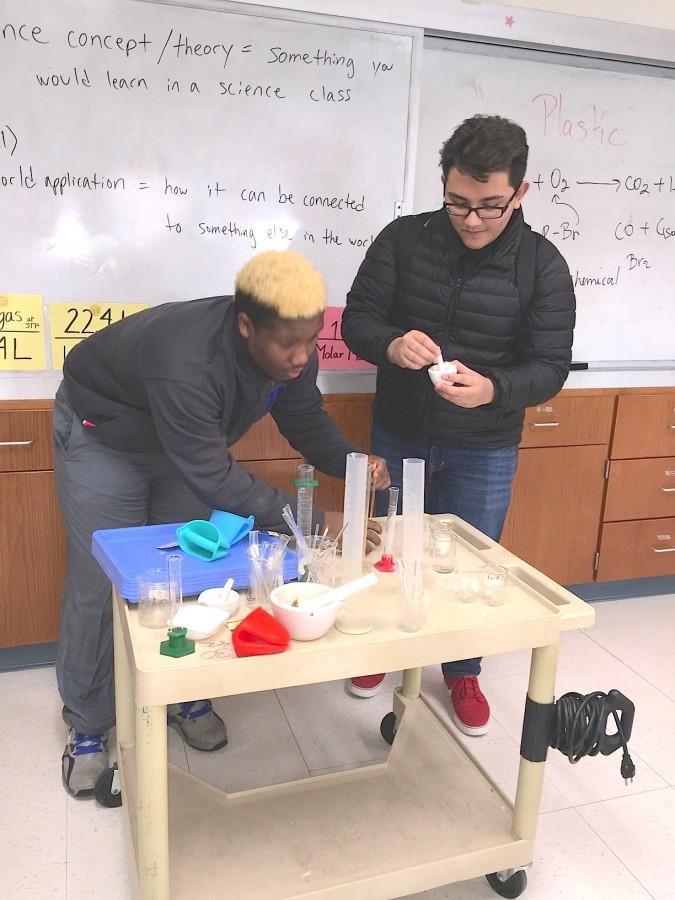A call to action: Chem students investigate Flint water crisis
Photo courtesy of Michelle McCabe
Solomon James, left, and Angel Romero collaborate on their Flint water crisis research.
March 4, 2016
Editor’s note: Students in Michelle McCabe’s Chemistry class recently explored aspects of the Flint, Mich., water crisis through reflection on classwork and reading assignments. Students summarized their thoughts with the hope of bringing attention to the issue of water quality across the nation. This article was researched and written by students Margaridha Ribeiro; Karrina Martinez; Solomon James; Aylin Salinas; Silvana Altamirano; Jamie Gundeck; Joel Suarez; Angel Romero and Ayadiri Perez
In 2014, the city of Flint, Mich., changed its water supply from the Detroit
River to the Flint River, allegedly, as a cost-saving measure. According to articles
published by the Royal Society of Chemistry and Mother Jones, the Flint River in the
past had been a dumping ground for industrial waste; as such a water remediation
was implemented.
The remediation program used extremely high levels of disinfectants, which
caused the water to be even more corrosive. The use of disinfectants such as ferric
chloride not only cause high levels of trihalomethanes, which itself can lead to liver,
kidney and nervous system problems (Mother Jones), but also lead to the corrosion
of the protective plumbing layers. The corrosion of already old pipes caused
extreme high levels of lead to leach into municipal water. Lead toxicity can have
irreversible neurological affects, especially in children.
Lead has been used in plumbing for a very long time and can be safely used if
monitored and maintained properly. In many cases, corrosion is kept under control
by adding corrosion inhibitors (SafePluming) such as phosphates. However, this
was not used in Flint (RSC).
Another significant mistake with the Flint incident was that the initial water
testing procedure was not sound or consistent, causing the initial data to be
questionable and unreliable. The Flint water contamination was ignored for several
months by the city/state before receiving the attention from the EPA
(Environmental Protection Agency) (DemocracyNow.org).
The issue received national attention by the persistence of private citizens,
which underscores the importance of individual awareness and scientific literacy in
the community.
A few questions remain unanswered: should the procedure for evaluating
water quality be revised? Should private citizens receive more information about
what is in their water? How can the study of water chemistry improve the quality of
potable water?
Articles Reviewed
SafePlumbing.org: https://www.safeplumbing.org/health-safety/lead-in-plumbing
Mother Jones: http://www.motherjones.com/politics/2016/01/mother-exposed-flint-lead-contamination-water-crisis
Royal Society of Chemistry: http://www.rsc.org/chemistryworld/2016/02/flint-toxic-water-crisis-lead
DemocracyNow.org: http://www.democracynow.org/2016/1/7/headlines/michigan_protesters_demad_arrest_of_gov_snyder_over_flint_water

































